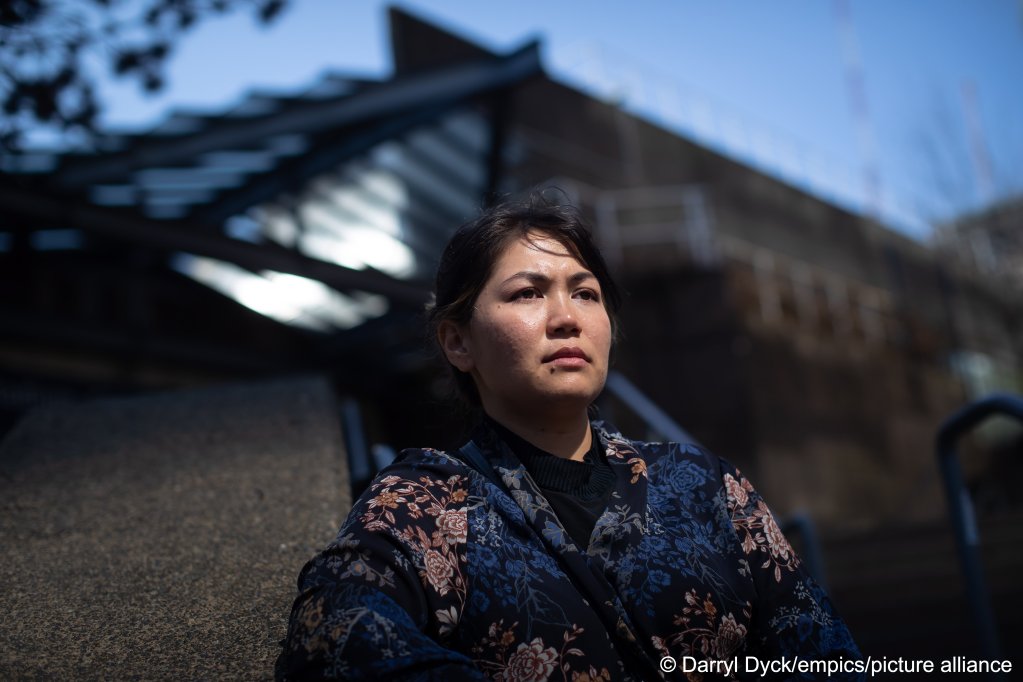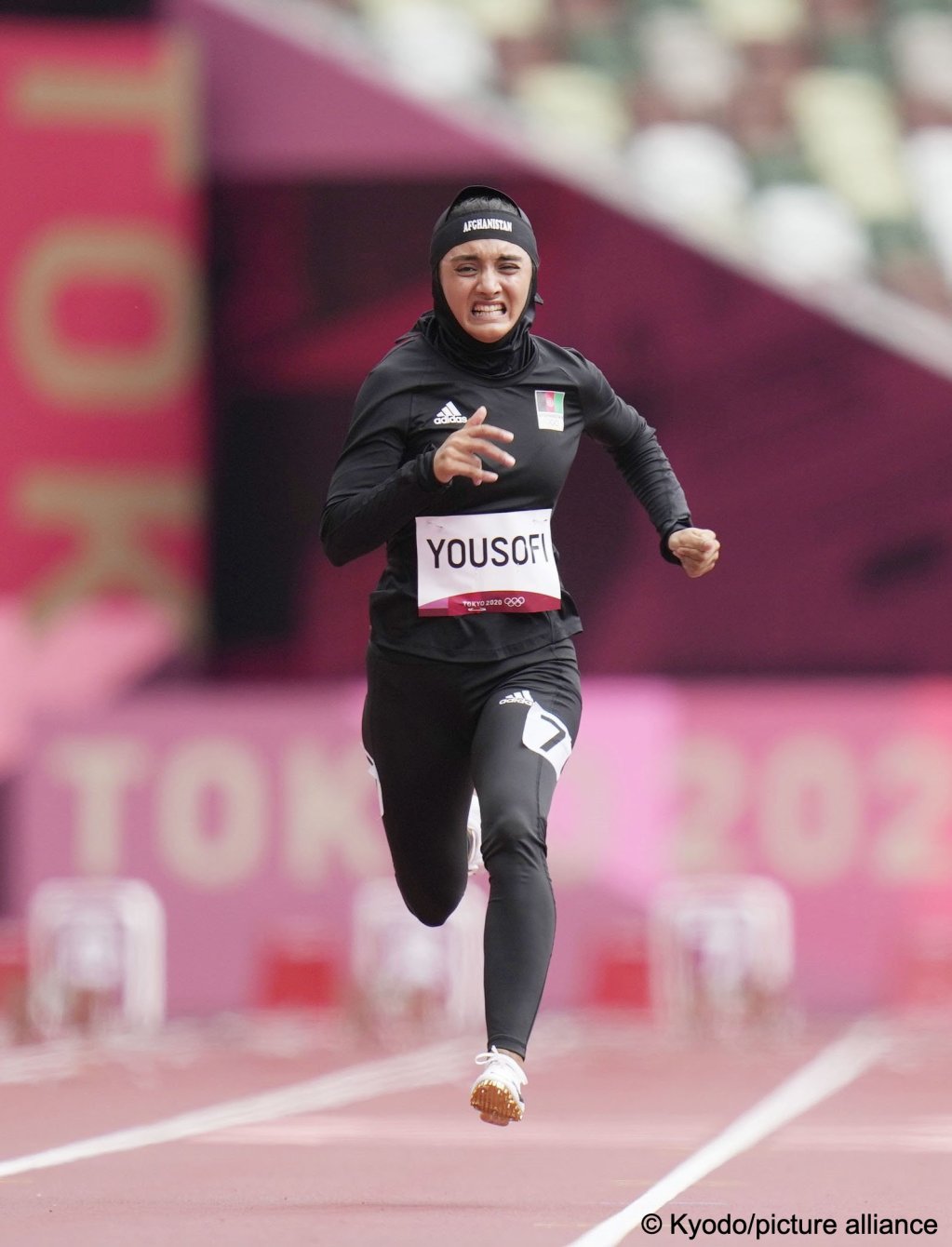The Olympic torch has been lit in Greece, but a fire of a different kind is raging over Afghanistan's participation in the upcoming Paris Games. One former Afghan athlete is calling for her country to be barred from the event.
In 2004, Friba Rezayee became the first woman to represent Afghanistan at an Olympic Games. At that time, Aghanistan was a country she could represent with hope and pride.
Two decades later, following the resurgence of the Taliban, she -- as well as other rights campaigners -- are now calling on the International Olympic Committee to ban Afghanistan from this year's Games in France and to allow Afghan women to compete as part of the Refugee Olympic Team instead.
"Given tons and tons of evidence about the Taliban, about their brutal treatment of women and children, they are very dangerous," said Rezayee speaking to Reuters from her new home of Vancouver, Canada. "If the IOC allows them to enter the Olympics at the heart of Europe, in Paris in 2024, it's very dangerous for the people."
According to Reuters, the Taliban spokersperson Zabihullah Mujahid declined to comment on Rezayee's statement or on the push to ban Afghanistan to participate in the games.

Since August 2021, the Taliban have imposed more and more restrictions on women and girls, including closing girls' high schools, preventing women from traveling without a male guardian, and forbiding them from playing sports.
Hundreds of Afghan women athletes have had to leave the country in order to continue to participate in sports.
Read more: Olympics: Female Afghan athletes in exile seek pathway
In response to a request for comment on Rezayee's call, Reuters said that the IOC had referred to a statement made last month by James Macleod, its Director of National Olympic Committee Relations and Olympic Solidarity.
Macleod said at the time that the IOC was in dialogue with Afghanistan's National Olympic Committee (NOC) and sport authorities "with the aim to reverse the current restrictions on access to sport for women and young girls in Afghanistan.".
He added that although the IOC acknowledged different views on whether Afghanistan's NOC should be suspended, it "doesn't believe that isolation of the Afghan sporting community at this time is the right approach."
Last December, the IOC itself said that Afghanistan's participation in the Paris Olympics would "depend on the progress made in relation to the fundamental issue of safe access to sport for women and young girls in the country."
Read more: First Afghans arrive in Germany under special admissions program

'It's the same Taliban'
Rezayee has repeatedly expressed her opposition to the IOC stance. The athlete is also far from being alone in criticizing the IOC's position: Human Rights Watch has long demanded that the Taliban be removed from the Olympic movement.
In an interview last November for Play the Game, a Danish group promoting democracy and transparency in sport, Rezayee said that banning Afghanistan should not be a difficult decision for the IOC:
"It’s very simple: Ban the Taliban-run Afghanistan for violating the Olympic Charter like the IOC did in the 1990s," she said, referring to the suspension of Afghanistan's NOC in 1999 and the banning Afghanistan from the 2000 Sydney Games.
"There is precedent. And it’s the same Taliban."
Rezayee, who left Afghanistan in 2011, recalls that when she stepped onto the mat in Athens at the age of 18, she believed she would help advance women's rights in her country. As she told Reuters: "I actually believed that we would only progress from here."
"When I returned from Athens, I stayed in Afghanistan and I wanted to stay in Afghanistan. I continued my training because I saw the important changes it was making in every single girl's life," she continued.
But Rezayee's hopes, like the hopes of many other Afghans, were destroyed when the extremist Taliban took over again in 2021.
"It feels like whatever I did to support women's rights and gender equality back in 2004, it has been all undone by the IOC and by the Taliban and people who tolerate the Taliban," she said.
Read more: Afghan refugee: 'I am safe, not a slave, thanks only to humanitarian corridors'
Stronger than men with guns
That doesn't mean that Rezayee, who founded a non-profit organization providing scholarships and education programs for Afghan women called Women Leaders of Tomorrow, has run out of optimism for the future.
"I believe that my principles and the principles of human rights, women's rights and women's dignity are stronger than men with guns," said the 38-year-old, who has also received serious threats for her activism.
As for her wish that Afghan female athletes could alternatively participate in Paris 2024 under the flag of the Refugee Olympic Team, the IOC has pointed out that only athletes whose refugee status has been confirmed by the UNHCR are eligible for that.
At the same time, the stories of Afghan women like Masomah Ali Zada indicate that almost anything is possible: Having grown up in a community in Afghanistan where girls were not encouraged to ride bikes, Masomah went on to compete in road cycling in the 2020 Tokyo Games.
In December last year she became the head of the Refugee Team for the upcoming Games.
Read more: Hila's tale: 'If no one wants me, then I want myself'
With Reuters
